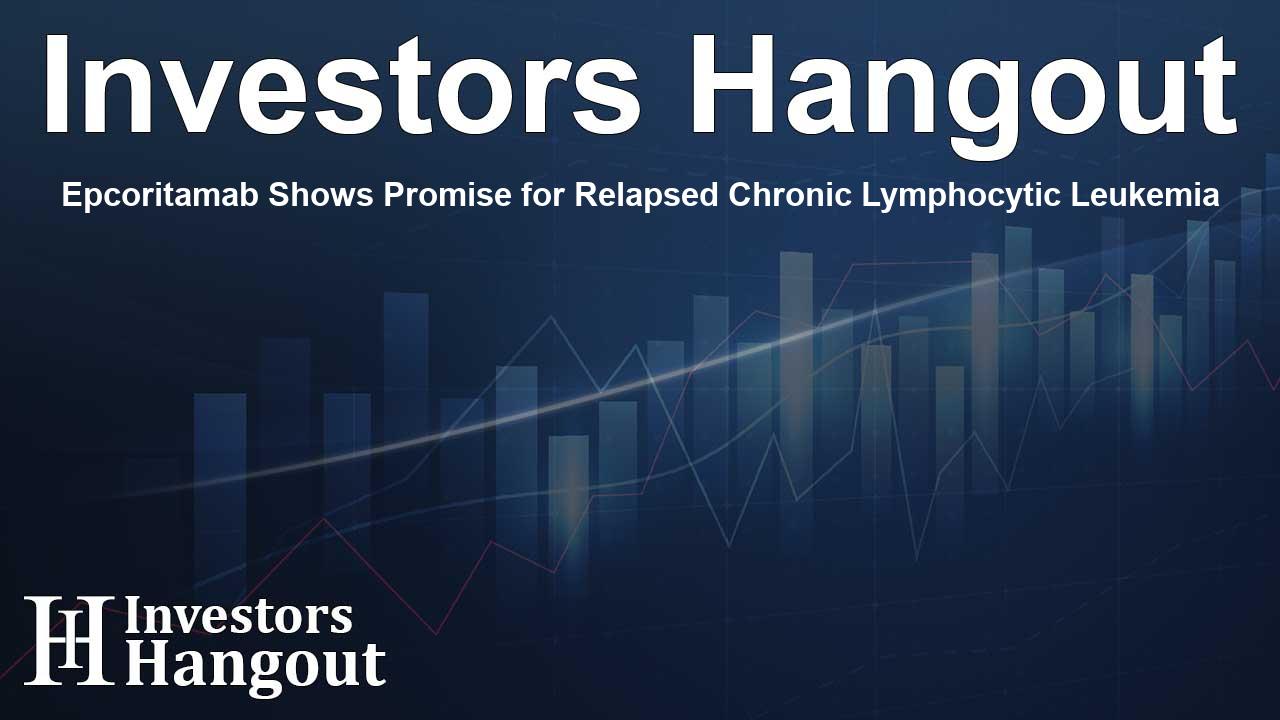Epcoritamab Shows Promise for Relapsed Chronic Lymphocytic Leukemia

Promising Results from Epcoritamab Monotherapy in Clinical Trials
Recent clinical trials have spotlighted the potential of Epcoritamab as a powerful therapy for patients grappling with relapsed or refractory chronic lymphocytic leukemia (CLL). Conducted by Genmab A/S (NASDAQ: GMAB), the EPCORE CLL-1 trial has shown encouraging results, garnering attention from the medical community for its implications in treating this challenging condition.
Key Findings of the EPCORE CLL-1 Trial
In the preliminary analyses from the EPCORE CLL-1 trial, Epcoritamab exhibited an overall response rate (ORR) of 61% and a complete response (CR) rate of 39% among patients who were heavily pretreated for chronic lymphocytic leukemia. This particular cohort consisted of individuals that had undergone various therapies, underscoring the significance of these findings.
Undetectable Minimal Residual Disease
Notably, 75% of evaluable responders achieved undetectable minimal residual disease (MRD) post-treatment with Epcoritamab. This outcome suggests that the drug may effectively eliminate traces of the disease, a critical factor in the management of CLL.
Understanding the Treatment Regimen and Outcomes
The study incorporated a cohort of 23 participants, and the data were presented at a significant meeting focused on diagnosing and treating blood cancers. The median time to response was captured at about two months, and the progression-free survival (PFS) rate stood impressively at 12.8 months. Additionally, researchers noted that the median overall survival (OS) has yet to be reached, indicating prolonged benefits for many of the patients involved.
Assessment of Treatment-emergent Adverse Events
With any treatment, understanding the safety profile is paramount. In this trial, the most prevalent treatment-emergent adverse events included cytokine release syndrome (CRS), which was reported in 96% of the participants, alongside fatigue and diarrhea. Fortunately, most cases of CRS remained manageable and did not require cessation of treatment.
Strategies for Managing Adverse Reactions
The trial's design included a step-up dosing approach to mitigate the severity of CRS. Results from a separate optimization cohort indicated a significant reduction in CRS severity, marking a positive advancement in the treatment protocol.
Expert Insights on Epcoritamab's Potential
Leading researchers like Alexey Danilov and Judith Klimovsky have expressed optimism regarding the therapeutic potential of Epcoritamab. They emphasized the ongoing need for innovative treatments for high-risk CLL patients who have limited options following standard therapies.
Chronic Lymphocytic Leukemia: An Overview
Chronic lymphocytic leukemia (CLL) is a prevalent form of leukemia that affects thousands of individuals. As a largely incurable disease, CLL necessitates ongoing treatment strategies to manage relapses and progression. Patients often require multiple therapies over their lifetime, highlighting the urgent need for effective options.
Further Developments and Research
Genmab is not resting on its laurels with the findings from the EPCORE CLL-1 trial. The company is currently engaged in multiple clinical trials that are assessing Epcoritamab in various hematological malignancies. Not only is the drug being evaluated as a monotherapy, but also in combination therapies aimed at enhancing its effectiveness.
About Genmab and Future Directions
Genmab is pioneering advanced antibody therapeutics with a commitment to treat difficult-to-manage cancers. The hope is to deliver innovative therapies that can significantly alter patient outcomes, particularly in the context of CLL and other B-cell malignancies. As more data becomes available, the future for Epcoritamab looks increasingly promising.
Frequently Asked Questions
What is Epcoritamab used for?
Epcoritamab is used in clinical trials for the treatment of relapsed or refractory chronic lymphocytic leukemia to evaluate its safety and efficacy.
What are the results of the EPCORE CLL-1 trial?
The trial reported an overall response rate of 61% and a complete response rate of 39% among heavily pretreated CLL patients.
How does Epcoritamab work?
Epcoritamab is a bispecific antibody designed to target CD3 on T cells and CD20 on B cells, promoting T-cell mediated killing of malignant cells.
What are the common side effects of Epcoritamab?
Common side effects include cytokine release syndrome, diarrhea, fatigue, and injection site reactions.
What are the future plans for Epcoritamab?
Genmab intends to continue evaluating Epcoritamab's efficacy in various combinations and therapeutic settings to expand its potential applications in treating cancer.
About The Author
Contact Olivia Taylor privately here. Or send an email with ATTN: Olivia Taylor as the subject to contact@investorshangout.com.
About Investors Hangout
Investors Hangout is a leading online stock forum for financial discussion and learning, offering a wide range of free tools and resources. It draws in traders of all levels, who exchange market knowledge, investigate trading tactics, and keep an eye on industry developments in real time. Featuring financial articles, stock message boards, quotes, charts, company profiles, and live news updates. Through cooperative learning and a wealth of informational resources, it helps users from novices creating their first portfolios to experts honing their techniques. Join Investors Hangout today: https://investorshangout.com/
The content of this article is based on factual, publicly available information and does not represent legal, financial, or investment advice. Investors Hangout does not offer financial advice, and the author is not a licensed financial advisor. Consult a qualified advisor before making any financial or investment decisions based on this article. This article should not be considered advice to purchase, sell, or hold any securities or other investments. If any of the material provided here is inaccurate, please contact us for corrections.
